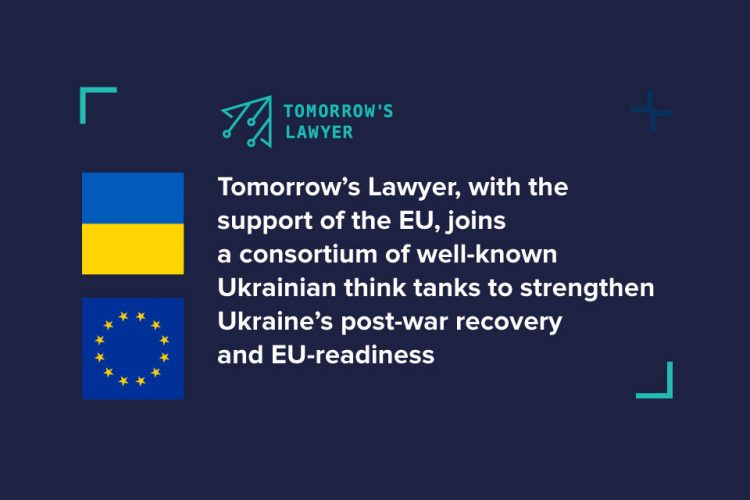


Five Benefits of the New Draft Law On the Bar and Practice of Law for Lawyers
 The Draft Law of Ukraine “On the Bar and Practice of Law” (No. 9055), which has been recently submitted to the Verkhovna Rada of Ukraine, caused a stormy discussion in the legal community. The “Tomorrow’s Lawyer” Program unites a community of agents of change, who care about the future of the legal profession.
The Draft Law of Ukraine “On the Bar and Practice of Law” (No. 9055), which has been recently submitted to the Verkhovna Rada of Ukraine, caused a stormy discussion in the legal community. The “Tomorrow’s Lawyer” Program unites a community of agents of change, who care about the future of the legal profession.
Andriy Vyshnevsky, CEO of the NGO “Tomorrow’s Lawyer” analyzed new draft Law of Ukraine No. 9055 “On the Bar and Legal Profession” and identified five key benefits for lawyers as follows.
- Access to the legal profession without corruption and disbursement:
- The examination to gain a qualification by written anonymous testing recorded by technical means is introduced.
- The obligatory six-month internship requirement is cancelled.
- Introducing additional professional rights of lawyers:
- Collecting evidence by any means is not prohibited by law.
- Identified access to state registers, except for registers containing information classified as a state secret, is introduced.
- Technical means not prohibited by law can be used without permission of officials or courts.
- Access to the following premises is unimpeded at any time if a client is located in any of them: courts, prosecutor’s offices, police stations, law enforcement agencies, other law enforcement offices, institutions for pre-trial detention and execution of punishments and state bodies.
- Any investigative (search) or procedural action can be participated in to which the client is entitled.
- New additional opportunities to practice law:
- The practice of law can be combined with the status of an official of an economic partnership or other legal entity.
- Law can be practiced within law firms (commercial companies in which a lawyer is a participant).
- Organization and conduct of mediation procedure and fiduciary activity can be participated in within the framework of practicing law.
- Just disciplinary procedure:
- A lawyer may be brought to disciplinary responsibility solely on the grounds provided for by law.
- A narrow circle of persons entitled to file a disciplinary complaint against a lawyer and the requirements for the form and content of a disciplinary complaint are clearly defined.
- An appeal against a decision in a disciplinary case suspends its action.
- A disciplinary offense as a violation of the oath of a lawyer of Ukraine has been removed.
- A systematic or gross one-time violation of the rules of legal ethics has been removed as a basis for suspending the right to practice law.
- A lawyer cannot be brought to disciplinary responsibility for expressing his or her own opinion on or position in a case, disagreement with a court ruling, decision or position of an authority or official of a body of legal self-government, any government body or local government, or for criticizing such decision or position, based on his or her own assessment of the relevant circumstances.
- A lawyer elected to a self-governing body shall not be brought to disciplinary responsibility for actions or omissions committed by him or her as an official (member) of such authority.
- Self-government, accountability:
- The period for which the Bar self-government bodies are elected is reduced from 5 to 3 years;
- Establishment of fees or other payments by legal self-government bodies other than provided for by this law is prohibited;
- Decisions of the bodies of the Bar self-government shall be published on the official website of UNBA not later than the day after their adoption;
- Eliminates regional discrimination of lawyers in the election of delegates to the Congress of Advocates of Ukraine: the quota of representation is the same for all regions;
- The Bar Council of Ukraine is deprived of authority to approve the rules of regional Bar conferences – the conferences are authorized to do this on their own;
- The Bar Council of Ukraine is deprived of authority to approve the provisions of the Regional Bar Council, the Qualification-Disciplinary Bar Commission and the Audit Commission of Regions;
- The Bar Congress of Ukraine and the regional conferences are empowered to review and cancel the decision of the Bar Council of Ukraine and the regional councils respectively;
- All lawyers with a permanent place of employment in the respective region have the right to participate in the regional Bar conference;
- All national and regional self-government bodies are deprived of the status of a legal entity and operate within the framework of the Ukrainian National Bar Association and regional Bar chambers independently without any subordination towards each other;
- The content of the reports and the procedure for the publication of financial statements of national and regional bodies of Bar self-government is established;
- The requirement to publish the conclusions of the High Audit Bar Commission of and regional Bar audit committees is established.
***
The opinions expressed in this article are the author’s own and do not reflect the view of the “Tomorrow’s Lawyer” Program, the Ukrainian Bar Association, the Bar Association of Legal Aid Providers, the Quality and Accessible Legal Aid in Ukraine Project, the Canadian Bureau for International Education, or the Government of Canada and the Law Enforcement Section of the United States Embassy in Ukraine.
“Tomorrow’s Lawyer” is a powerful network of lawyers uniting opinion leaders in the legal profession, who provide legal assistance in accordance with the highest ethical standards, act as agents of change in society and leaders in the professional community.
The Program was developed during 2016-2017 with the support of The Quality and Accessible Legal Aid Project with an expert contribution from the Canadian Bar Association. In 2018, the “Tomorrow’s Lawyer” Program is being implemented by the Ukrainian Bar Association and the Bar Association of Legal Aid Providers, with the support of the United States Embassy and The Quality and Accessible Legal Aid in Ukraine Project funded by the Government of Canada and implemented by the Canadian Bureau for International Education (CBIE).


